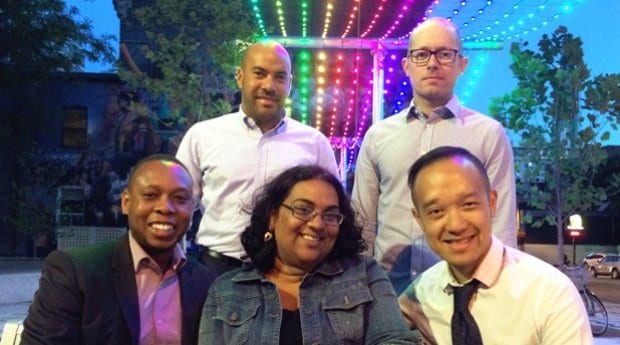By all measures, Canada is a model of acceptance of LGBT people and enjoys an enviable history of openly gay and lesbian people holding elected office. Yet despite our legal equality, LGBT people can still face barriers when running for office, according to a new organization that aims to help queer political candidates overcome obstacles to entering politics.
ProudPolitics, a coalition of queer activists from across the political spectrum, aims to get more LGBT people into office by giving them the tools and training to run a campaign effectively.
The young organization already has a national advisory council made up of current and former politicians from all levels of government and political stripes, including former MP Bill Siksay, former MPP Phil Gillies and school board trustee Paul Marai.
“We believe that LGBT candidates can be the biggest champions of inclusion, regardless of political affiliation, and can be really effective change agents within their parties or political organizations,” says Arthur Kong, executive director of ProudPolitics.
Although gay men and women enjoy legal equality in Canada, LGBT people seeking office may not have access to traditional avenues of power and may face whisper campaigns from opponents hoping to exploit homophobia. Even the simple act of coming out publicly can be fraught with questions of whether, and to what degree, one’s sexual and gender identity should be part of an electoral campaign.
“Homophobia in political life is very real, and it is exploited because homophobia in our society is real,” says Nadia Bello, a former school board trustee who’s also on the national advisory council. “[Being out] might not be a priority for that person. The last thing on their agenda may be to be out or talk about their message in terms of their sexuality.”
Curtis Atkins, deputy executive director of research at ProudPolitics, notes that the 2011 Ontario election featured PC candidates distributing homophobic literature that targeted swing ridings and ethnic minorities, and even Kathleen Wynne’s leadership run featured a whisper campaign about her perceived vulnerability to homophobia. Atkins is working on a research project called the State of the Political Rainbow, which is taking a statistical approach to where out candidates have run in the past and what obstacles remain.
“A lot of the folks we’re working with are running for local office. Your base of voters is small in a lot of places. If you’re facing an unscrupulous opponent who believes they can exploit this as a wedge issue to draw . . . a couple hundred votes, that could be enough to swing an election,” he says. “We want candidates to be aware that you will possibly face this.”
ProudPolitics is consciously modelled on successful organizations like the Gay and Lesbian Victory Fund and the Human Rights Campaign in the US, which raise money for LGBT candidates, but with several key differences related to the Canadian system. ProudPolitics does not give money to LGBT candidates (partly because of laws that ban third-party donations federally and in Toronto). It doesn’t even endorse candidates or policies.
In part, that stems from a political culture in Canada where all major parties support LGBT rights to at least some extent. But it also highlights the differing motivations and goals of queer political power in Canada and the US in 2014.
“In the US, the struggle is still [for] legal equality and employment non-discrimination. When you’re up against that kind of battle, it motivates people to come out and support it financially in a different way than it does in Canada,” says Atkins, who hails from Arkansas.
The goal is simply to give LGBT candidates the tools and training to learn how to manage their own campaigns and to build a support network for LGBT people in politics.
“A goal is also to encourage LGBT people to realize that they can be judged by voters on their merit and to teach them you don’t have to be intimidated to run,” Atkins says.
Bello agrees that the training would be useful for new candidates who want to make a difference but don’t understand how the system really works.
“A lot of times, candidates come because they want to change something; they see the way things are and they don’t like it. Wherever your affiliation lies, you learn quickly that you cannot be a single-issue candidate,” she says. “I got elected when I was 27 years old, and the system is not set up to support young people who want to run for office. It assumes you’re independently wealthy or you have someone to support you, particularly at the trustee level, because you don’t earn a salary or benefits the way other levels do.
“The training really helps ground candidates in where do they stand around their identity, and how do they communicate that message to other people,” Bello says. “It’s also a strategic piece around what is your relationship to the community? Can you speak articulately about the issues around queer youth, housing, any of the issues that LGBT people might be facing?”
ProudPolitics is also working with the Canadian Lesbian and Gay Archives to collect and archive the stories of LGBT politicians who have run for office, both to preserve the history and to learn from what these people have overcome on their journeys.


 Why you can trust Xtra
Why you can trust Xtra


